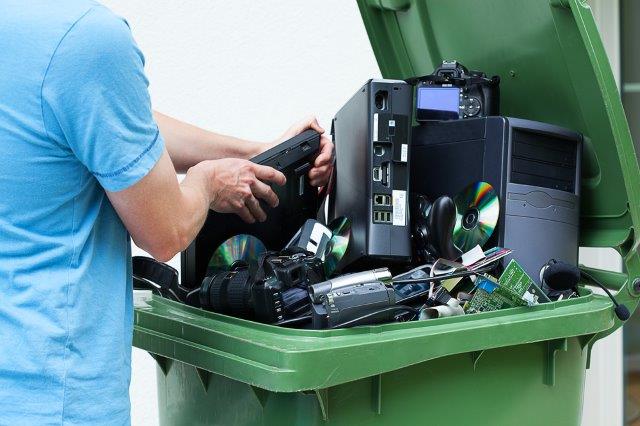Revolutionizing the Future: The Importance of E-Waste Recycling

As technology continues to advance at a rapid pace, electronic devices are becoming an integral part of our daily lives. Consequently, so does the e-waste and e-waste recycling industry.
E-waste refers to discarded electronic devices such as computers, smartphones, and televisions, which pose a significant threat to both the environment and human health if not effectively managed.
However, we need to understand the major concern e-waste poses, and how adequate e-waste recycling centers near you can help you be a responsible Samaritan.
Understanding E-Waste Recycling
E-waste recycling is the process of reusing or recovering valuable materials from electronic devices to reduce environmental impact and conserve resources.
It involves the collection, sorting, dismantling, and recycling of electronic waste to extract precious metals like gold, silver, and copper, as well as recover hazardous substances such as lead and mercury.
By recycling e-waste, we can minimize the need for raw materials extraction, reduce energy consumption, and prevent the release of harmful chemicals into the environment.
The Environmental Impact of E-Waste
The environmental impact of e-waste is significant and far-reaching. When electronic devices are improperly disposed of in landfills, they can release toxic chemicals into the soil and groundwater, contaminating ecosystems and posing a threat to both wildlife and human health. Additionally, the production and disposal of electronic devices contribute to greenhouse gas emissions, exacerbating climate change. By recycling e-waste, we can mitigate these environmental risks and help create a more sustainable future.
E-waste recycling also helps conserve natural resources, which is why companies such as Recycle Tehcnologies has made it their motto to bring awareness to this global problem.
Recycling with the right company allows retention of many valuable metals from electronic waste.
By extracting these metals from e-waste, we can reduce the need for mining, which often leads to deforestation and habitat destruction. Furthermore, recycling e-waste helps conserve water and energy, as the extraction and processing of raw materials require significant amounts of both.
The Economic Benefits of E-Waste Recycling
In addition to its environmental impact, e-waste recycling offers numerous economic benefits. The recovery of valuable materials from electronic devices can create new business opportunities and stimulate economic growth.
Recycling e-waste also reduces the cost of raw materials production, making it a more cost-effective alternative to traditional mining and extraction.
Furthermore, e-waste recycling can generate employment opportunities, particularly in developing countries. The collection, sorting, and processing of e-waste require skilled labor, providing jobs for individuals in the recycling industry.
By investing in e-waste recycling infrastructure and creating supportive policies, governments can promote job creation and enhance economic development.
E-Waste Recycling: Where We Stand Currently
To utterly understand the importance of e-waste recycling, it is essential to examine the scale of the problem. According to the Global E-waste Monitor 2020, the world generated a staggering 53.6 million metric tons of e-waste in 2019, with only 17.4% being properly collected and recycled. This means most e-waste ends up in landfills, incinerators, or is dumped illegally, posing significant environmental and health risks.
The report also highlights the growing e-waste challenge, projecting that global e-waste generation will reach 74 million metric tons by 2030 if no action is taken. This alarming statistic underscores the urgent need for increased e-waste recycling efforts to prevent further environmental degradation and resource depletion.
The Process of E-Waste Recycling at Recycle Technologies
At Recycle Technologies, we have a multi-step process to ensure the safe and efficient recovery of valuable materials. The first step is collection, where electronic devices are gathered from households, businesses, and collection centers.
We encourage people of Wisconsin and Minnesota to search for a recycling facility near them through ‘recycling facility near me‘ to locate us in no time.
Next, the collected e-waste is sorted based on its type and potential for recycling. This sorting process helps separate valuable components from hazardous materials, ensuring proper treatment and disposal.
Once sorted, the e-waste undergoes dismantling, where it is disassembled into smaller parts. This step allows us to extract precious metals. It is also where our experts separate hazardous substances carefully.
The extracted materials are then sent for further processing, where they are refined and purified to be used in the manufacture of new electronic devices or other products.
The hazardous substances, on the other hand, are treated and disposed of according to strict environmental regulations of both the states.
E-Waste Recycling Regulations and Policies
To address the growing e-waste problem, many countries have implemented regulations and policies to promote e-waste recycling.
These regulations aim to ensure proper disposal and treatment of electronic waste and encourage manufacturers to design more sustainable and recyclable products.
In the United States, the Resource Conservation and Recovery Act (RCRA) governs the management of hazardous waste, including e-waste. These regulations play a crucial role in creating a framework for responsible e-waste management and driving the transition towards a circular economy.
However, they are not nationally binding. We wish for a national policy against e-waste in a more comprehensive approach, which has yet to be understood clearly at the end of the day.
The Role of Individuals in E-Waste Recycling
While regulations and policies are essential, individual actions also play a significant role in e-waste recycling. Proper disposal and recycling of electronic devices should be a priority for everyone.
Instead of throwing old devices in the trash, individuals can take them to designated e-waste collection centers or donate them to organizations that refurbish and redistribute them.
Educating and raising awareness about e-waste recycling is also crucial. By understanding the environmental and health risks associated with improper e-waste disposal, individuals can make informed decisions and actively participate in recycling initiatives.
Simple actions like reducing electronic waste, repairing devices instead of replacing them, and supporting e-waste recycling programs can make a significant difference in preserving our planet and its resources.
E-Waste Recycling Technologies and Innovations
Advancements in technology are also playing a crucial role in revolutionizing e-waste recycling. Researchers and innovators are developing modern technologies to improve the efficiency and effectiveness of e-waste recycling processes.
For instance, automated systems are being designed to streamline the dismantling and sorting of e-waste, reducing the reliance on manual labor, and increasing recycling rates.
Furthermore, innovations in material recovery techniques are enabling the extraction of a wider range of valuable and rare metals from e-waste. This not only enhances resource conservation but also reduces the environmental impact of traditional mining operations.
Additionally, advancements in data security and data destruction technologies ensure that personal and sensitive information stored on recycled devices is properly erased, addressing privacy concerns.
Also Read: Easy and Effective Smoke Detector Recycling Kits
Conclusion: The Future of E-Waste Recycling
In conclusion, e-waste recycling is of paramount importance in the quest for a more sustainable and eco-friendly future. By understanding the environmental impact of e-waste, promoting responsible recycling practices, and supporting initiatives and organizations working towards e-waste recycling, we can create a positive change.
The implementation of effective regulations and policies, coupled with technological advancements and individual actions, will pave the way for a revolutionized future of e-waste recycling.
Join the movement with Recycle Technologies and be part of the solution. Recycle your e-waste responsibly, spread awareness, and support organizations such as Recycle Technologies that are committed to making a difference.
Together, we can minimize the environmental and health risks associated with e-waste and shape a better future for generations to come.






